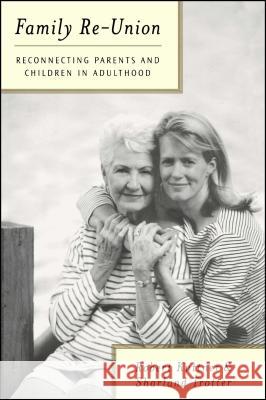Family Re-Union: Reconnecting Parents and Children in Adulthood » książka
Family Re-Union: Reconnecting Parents and Children in Adulthood
ISBN-13: 9781416567783 / Angielski / Miękka / 2007 / 292 str.
All our lives, we seek affirmation and love from the people closest to us -- our parents and, later, our grown children. But too few of us get it. As adults, many of us feel that our aging parents still treat us like kids. As parents, many of us are sad that our adult children seem to have little use for us.
When Robert Kuttner and Sharland Trotter were writing Family Re-Union, many new empty-nesters told them, "I hope I have a better relationship with my kids than I did with my parents." Family Re-Union offers insights on how adults and their parents can cultivate new adult- to-adult lifelong connections and become deeper friends. It is the first book to explore this challenge over the entire life course -- from a teenager's departure for college to the impending death of an aging parent. Kuttner, a well-known journalist, and Trotter, a clinical psychologist, conceived the book when their son had just gone off to college and their daughter was a junior in high school. The message of Family Re-Union is deepened by the unusual circumstances of its writing: a year into the work, Sharland Trotter learned she had cancer. As Sharland deals with her illness and invites her family into her journey, the book takes on additional relevance for all those facing their own mortality -- whether prematurely or at the natural end of a long life span -- and seeking to repair family relationships. But Family Re-Union will prove indispensable for all adults, from the twenty-five-year-old who finds her parents overbearing, through the forty-year-old hoping to have a better relationship with his son than he had with his father, to the seventy-year-old trying to reconnect with a middle-aged daughter, and all steps in between. These are life stages we all encounter, and Family Re-Union offers hope that, no matter what our personal circumstances, it is never too late to create loving, respectful family ties.Family Reunions explores the strains in relations between the middle-aged and their adult children, on the one hand, and their elderly parents on the other. Baby boomers in their search for advice on how to negotiate healthy relations at either end usually come up empty-handed. Amid a forest of self-help and pop psychology books, shelves of how-to manuals on parenting, where is the book that addresses the yearning that parents and grown children have for meaningful, authentic, "adult" connection? Now, here is the book that shows how autonomy and connection are not opposites, but complements. A true collaboration between a husband who is a respected journalist, columnist, and author, and a wife who was a practicing psychologist and author. Dr. Trotter died before the book was finished, yet her ideas and therapy experience rise up from these pages. Because of the unusual circumstances of its writing--Sharland Trotter learned she had cancer about a year into the work of the book--and the unusual way the author dealt with her mortal illness, this is a highly personal book. Any adult picking up this book will be able to find it relevant to her own age and circumstance because the narrative follows the entire life course. Wise and informed, the authors examine and propose strategies for the traps that parents and grown children fall into. Ultimately, they offer hope that it is never to late to create loving, respectful family ties.











